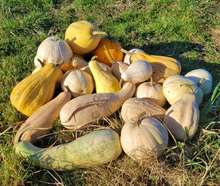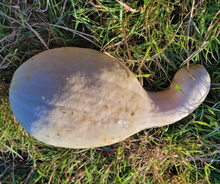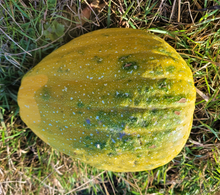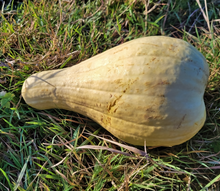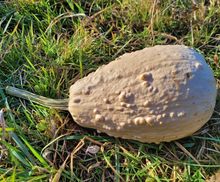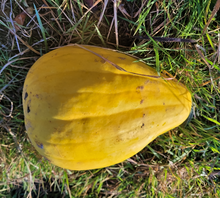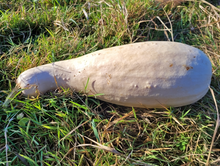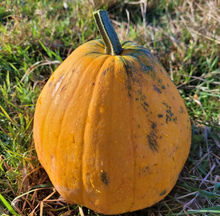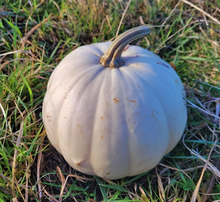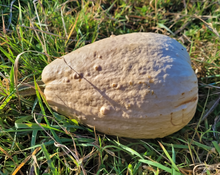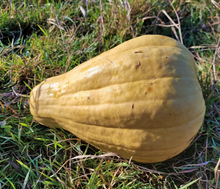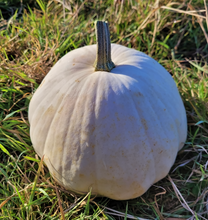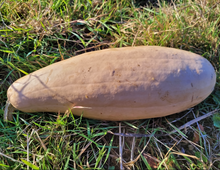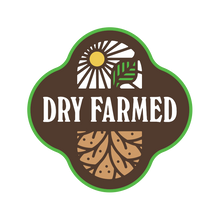Maycock (Tall White Selection) Squash Landrace
Regular price
$4.00
Sale
Cucurbita pepo
Origin: Nanticoke people (Delaware)
Improvement status: Landrace
Seeds per packet: ~25
Germination tested 10/2025: 98%
Life cycle: Annual
Maycocks were long the summer squash of the Nanticoke people, indigenous to the central Delmarva Peninsula and southern New Jersey. The name seems to be an English-sounding version of the Nanticoke word for squash, "macac." Like the Nanticoke winter squash (Cucurbita maxima), these maycocks (Cucurbita pepo) are very diverse in form and color. That diversity is the variety's strength though, making the population resilient in the face of pests, diseases, extreme weather, weed pressure, etc. Over the past 200 years, so much Cucurbita pepo biodiversity has been lost, with most commercial offerings today being ephemeral F1 hybrids. There are precipus few historic landraces still in existence — making these seeds even more important to preserve. Traditionally, maycock fruit were eaten fresh but also commonly sliced and dried for winter use. Few alive today have even heard of the very special maycock squash, let alone tasted one — and if not for a fortuitous meeting in the 1980s, this wonderful landrace might have disappeared forever, like so many others.
Here's the story: Early in his seed-saving career in the 1980s, Dr. William Woys Weaver of the Roughwood Seed Collection (also an EFN Board Member and friend) was invited to give a presentation in Mullica Hill, NJ, organized by local Quakers. According to his telling, the organizers couldn't afford to pay him a fair rate, so he asked them to tell attendees in advance to bring their heirloom seeds with them. One attendee turned out to be a Nanticoke elder named Fanny Johnson who had made the trip across the river from Delaware. She brought with her a handful of maycock seeds and told Dr. Weaver that she had little trust that anyone among her people would keep them up after she was gone, so she hoped very much that he would keep them alive. He was happy and honored to oblige.
After growing them out a few times, and with a diligent researcher's knowledge of historical accounts of indigenous agriculture in the region, Dr. Weaver came to believe that the diversity present in the maycock population now in his hands represented a composite of many different historical varieties. Ms. Johnson, and likely generations of her forebears, simply called them all maycocks, and by the time she was growing them they were essentially one diverse variety. But Dr. Weaver worked off and on through the years attempting to select different strains — and these seeds are one such strain which he labeled "tall white." Its fruit come in a range of sizes, shapes, and colors, though pale cream to yellow certainly predominate in this selection (others are green and white or more yellow, some are smooth, some warty). Our dear friend and grower Chris Homanics of Head, Hands, Heart Nursery and Seed grew them out last year in Washington state and produced a bumper crop. Chris is not easily impressed, but these maycocks did just that. We grew three Weaver selections in New Jersey (different from this one) with the intention of recombining them into something approximating the landrace as Fanny Johnson knew it (and we expect to have enough to release some next year). As of this edit (summer 2023), we're growing four of Dr. Weaver's selections are growing all together at the Princeton Seed Farm — currently the most isolated field available to us. We're excited to see what kind of diversity begins to appear once these families of squash are all brought back together.
Below is a grower/eater report from Chris:
“True-to-form, the fruits of maycock when picked immature make an excellent firmly textured summer squash if baked or grilled as one would do with a zucchini. As a winter squash, the texture is similar to a finely textured spaghetti squash. Like any winter squash, fruit quality improves after at least a month of indoor after-harvest ripening. Flesh color is mostly white to shades of yellow with a few exhibiting a beautiful bright orange sherbet color. Fruits range in weight from about 1.5 lbs to over 7 lbs, with an average close to 3 lbs. While many of the squash are white, quite a few are off-white to yellow, with a mix of others that are blue, pink, and even orange. Some fruits have a gorgeous speckled patterning that reminds me of Starry Night by Vincent van Gogh. Most squash are ribbed, some lightly so while others have it much pronounced. Shapes range from round to acorn to crookneck to long banana shapes. A beauty of diversity fitting for a fall display.
These maycocks performed extremely well during this year's four-month drought and despite only receiving an initial watering at transplant, plants remained dark green and lush under dry-farming conditions throughout the summer into fall when the first rains began. Plants are quite tall and sprawl over a large area. They produced abundantly despite being planted in late July due to an unprecedentedly cold spring. While the other surrounding farms had difficulty ripening their winter squashes this season, Maycock did not struggle to ripen its fruits with ample harvest time in the fall. This maycock selection is evidently resistant to both powdery mildew and black rot. Maycock is truly a great squash variety for short-season areas.”
Today, the Nanticoke people still live in Delaware, Maryland, and southern New Jersey (very near to the EFN flagship farm in Elmer), mainly in Cumberland County. As with the Nanticoke winter squash, which we originally got from Seed Savers Exchange, as far as we know we are the first people in New Jersey to grow this squash in at least a few generations — and so we've been especially grateful to begin getting to know the local Nanticoke community and to be able to return seeds to a new generation of Nanticoke seed keepers (first here in New Jersey, and over the past year to some folks in Delaware too, as well as to Nanticoke people living in diaspora, in places like Michigan and Maine). We offer voluntary royalties of 25% of the sales of the Nanticoke winter squash to the Nanticoke - Lenni Lenape Tribal Nation here in New Jersey, and we will offer the same 25% of the sales of these Nanticoke maycocks to the Delaware-based Native Roots Farm Foundation, led by stellar Nanticoke organizer Courtney Streett. The remainder is split between EFN and grower Chris. Any Nanticoke or Lenape people who would like to grow this squash should please contact us. We are more than happy to refund them from your order or send you some at no cost. These are your seeds, not ours.
Rematriating seeds was not part of our plan when we started EFN, but it has become some of the most meaningful and important work we do. As we've learned more and more about the deep spiritual resonance of seeds (especially among people who consider them to literally be relatives), we couldn't work with seeds without participating in rematriation processes as well. Having access to seeds like these makes it our responsibility to share them. It's also an honor and a privilege to help get these seeds back home.















